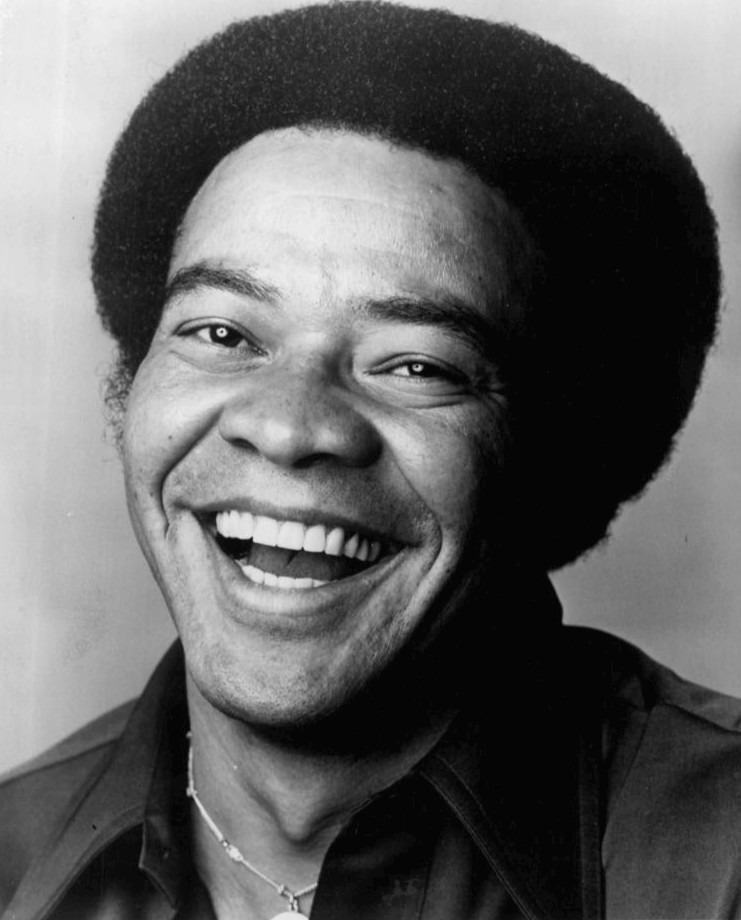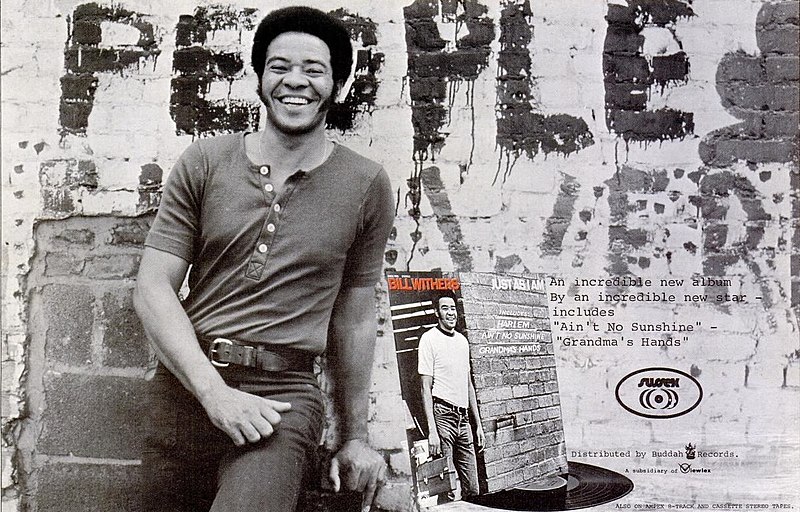In the annals of music history, there are artists whose legacies transcend their melodies, echoing through time with a resonance that is felt more than heard. Bill Withers, a luminary in the world of soul and R&B, is one such artist. Yet, the path that led him to become a beloved figure in music is shrouded in as much mystique as it is marked by his well-known hits like “Lean on Me” and “Ain’t No Sunshine.”
This article aims to be the prelude to the deeper, less explored narratives of Bill Withers’ life and career. Before we immerse ourselves in the familiar refrains of his classic songs, we first pause at the crossroads of his early life, exploring the foundation that shaped the man behind the music.
Here, we begin our journey, not with the icon that the world came to know, but with the untold stories and unseen melodies that set the stage for one of the most soulful artists of our time.
Early Life and Background
Born on July 4, 1938, in Slab Fork, West Virginia, William Harrison “Bill” Withers Jr. was a renowned soul and R&B singer-songwriter. His early life in a coal-mining town was marked by the loss of his father at the age of thirteen. Seeking new opportunities, Withers enlisted in the US Army at eighteen and served for nine years before being discharged. He then moved to Los Angeles to pursue his musical ambitions.
While working as an assemblyman at Boeing during the day, Withers dedicated his evenings to songwriting and recording demos. One of these demos caught the attention of Clarence Avant, the owner of Sussex Records, leading to Withers signing with the label in early 1970. His debut album, “Just As I Am,” produced by Booker T. Jones, was released in 1971 and achieved commercial success, highlighted by the Grammy-winning hit “Ain’t No Sunshine.” The album’s follow-up single, “Grandma’s Hands,” also gained popularity.
Withers’ second album, “Still Bill,” released in 1972, further cemented his success, featuring the iconic singles “Lean On Me” and “Use Me.” His songwriting extended beyond his records; he wrote and produced for Gladys Knight & The Pips and contributed to the soundtrack of Bill Cosby’s 1971 film “Man And Boy.”
After Sussex Records folded, Withers signed with Columbia Records in 1975, continuing to release successful albums like “Making Music, Making Friends,” “Naked & Warm,” and “Menagerie,” the latter featuring the hit “Lovely Day.” His collaboration with Grover Washington, Jr. on “Just The Two Of Us” in 1981 earned two Grammy Awards. Despite his later albums like ‘Bout Love’ and ‘Watching You, Watching Me,’ his influence and legacy in the music industry remained profound.
The Unseen Beginnings of His Music Career
Before his rise as a soul and R&B icon, Bill Withers led an unconventional path into the music industry. After serving nine years in the US Army, he relocated to Los Angeles, where he worked as an assemblyman at Boeing. Despite the demanding nature of this job, Withers pursued his passion for music by writing songs and recording demos in his spare time. His entry into music was self-driven; he invested his own money into making demos without formal training or industry connections.
His big break came when one of these demos caught the attention of Clarence Avant, owner of Sussex Records, leading to a record deal that marked the beginning of his professional music career. This transition from a factory worker to a celebrated recording artist exemplifies Withers’ determination and passion for music.
Top 5 Hits of Bill Withers
His top hits, which have left a lasting impact on the music industry, include:
- “Lean on Me” – This song is one of Withers’ most famous tracks, known for its message of friendship and support. It has been covered by many artists and remains a staple in popular music.
- “Ain’t No Sunshine” – This is another classic Bill Withers song, characterized by its melancholic tone and simple, yet powerful lyrics. It’s widely regarded as a masterpiece in soul music.
- “Lovely Day” – Featuring one of the longest-held notes in a song, “Lovely Day” is a feel-good tune that showcases Withers’ ability to create uplifting music.
- “Just the Two of Us” – This song, a collaboration with Grover Washington Jr., is a smooth jazz hit that highlights Withers’ versatility as an artist.
- “Use Me” – This track stands out for its funky rhythm and candid lyrics. It’s another example of Withers’ talent in blending soulful melodies with relatable themes.
Rise to Fame
Bill Withers’ journey to stardom is like a classic underdog story. After signing his first record deal at 32, he released his debut album, “Just As I Am,” in 1971. The album cover, featuring Bill with his lunch pail from his airplane parts job, set the tone for his authentic approach to music.
The breakthrough came with “Ain’t No Sunshine,” a song from his debut album that resonated deeply with listeners, earning him a Grammy, and launching him into the spotlight. But it did not stop there. Bill continued to capture hearts with “Grandma’s Hands,” a soulful tribute to his grandmother, showcasing his depth as a songwriter.
Despite his rising fame, Bill remained remarkably grounded, famously keeping his day job for a while even after achieving success. His humility and practicality were as much a part of his charm as his music.
In 1972, Bill released “Still Bill,” featuring the timeless classic “Lean on Me.” This song, with its universal message of support and community, became an anthem and propelled him even further, cementing his place in the music world.
Bill Withers’ rapid ascent from a factory worker to a celebrated musician is a testament to his genuine talent and relatable style. His music, transcending genres, and generations, started from humble beginnings but grew to touch the hearts of millions.
Artistic Evolution
In the early days, right after “Ain’t No Sunshine” hit the airwaves, Bill’s style was pretty straightforward – soulful, a bit of blues, and deeply personal. His songs were like open letters, filled with raw emotion and real-life stories. You could say his music was a mirror of his own experiences, reflecting his thoughts and feelings in a way that everyone could relate to.
As Bill’s career progressed, you could see him getting more comfortable in his musical skin. By the mid-1970s, with albums like “Still Bill” and “Making Music,” there was a noticeable shift. His songs started to have a bit more funk, a little jazz, and even some gospel vibes. It was like he was experimenting, playing around with different sounds, and seeing what fit best.
One of the cool things about Bill was that he never shied away from collaboration. He worked with a variety of musicians, which brought new flavors to his music. It is like when you are cooking, and you try out a new spice – sometimes it just brings the dish to life in a whole new way. That is what these collaborations did for Bill’s music.
But here is the thing: even as his style evolved, Bill never lost his signature simplicity and heartfelt storytelling. Whether he was getting funky on “Lovely Day” or soulful on “Just the Two of Us,” his songs always felt like they were coming straight from the heart. He had this way of making every track feel personal like he was singing just to you.
By the late 1970s and early 1980s, Bill’s music had grown and changed, but the core – that honest, soulful sound – was always there. His ability to evolve while staying true to himself is what kept fans hooked and attracted new listeners. In a world where music trends come and go, Bill Withers stood out as someone who was always true to his art.
Challenges and Triumphs
Bill’s entry into the music industry was not smooth sailing. One big hurdle was his late start. Breaking into music in your thirties, especially back then, was like starting a marathon mile behind everyone else. Then there was the music industry itself. It can be a tough, unforgiving place, and Bill, with his honest, no-frills style, sometimes clashed with record executives who wanted something flashier or mainstream.
But Bill was not one to be easily swayed. He stuck to his guns, insisting on creative control over his music. This meant turning down opportunities that did not feel right, even if they promised more fame or money. It was a brave stance, but it also meant his career did not always go the way the industry expected.
Each of his major hits, from “Ain’t No Sunshine” to “Lean on Me” and “Just the Two of Us,” not only won him awards but also earned him a place in the hearts of millions. These songs transcended music; they became part of people’s lives and played at weddings, funerals, and everything in between.
One of the sweetest triumphs was the lasting impact of his music. Long after he stepped back from the spotlight, his songs continued to inspire new generations of artists and fans. Covers of his hits popped up all over the place, each one a testament to the timeless quality of his work.
Bill’s story is a blend of challenges and triumphs, like any great artist’s. But what stands out is how he navigated the music world with integrity and authenticity. He faced the industry pressures, the late start, and the struggle for creative freedom, coming out on the other side not just as a successful musician, but as a beloved and respected figure in the world of music.
Legacy and Influence
Bill Withers’ legacy in the music world is profound and enduring. His timeless classics like “Lean on Me” and “Ain’t No Sunshine” have become more than just songs; they are integral parts of our cultural landscape, echoing through generations.
What sets Bill apart is his authenticity. In an industry often dominated by trends, Bill’s straightforward, heartfelt approach to songwriting has made a lasting impact. He wrote about real life, connecting with people’s emotions in a way that few artists can.
His influence spans across genres, inspiring not just soul and R&B artists, but also musicians in hip-hop, rock, and more. Bill’s style of combining soulful melodies with deeply personal lyrics has become a blueprint for many artists.
Moreover, Bill’s integrity in the music industry, his commitment to his vision, and his ability to achieve success on his terms have made him a role model for artists seeking to navigate the complexities of the music world.
In essence, Bill Withers’ legacy is one of timeless music, authenticity, and an enduring influence that continues to inspire artists and audiences alike.
Conclusion
Bill Withers’ journey through life and music is a story of authenticity, resilience, and timeless appeal. His songs, marked by their emotional depth and simplicity, continue to resonate and inspire long after their initial release. Bill Withers stands as a testament to the enduring power of heartfelt music, leaving a legacy that transcends time and genre.



